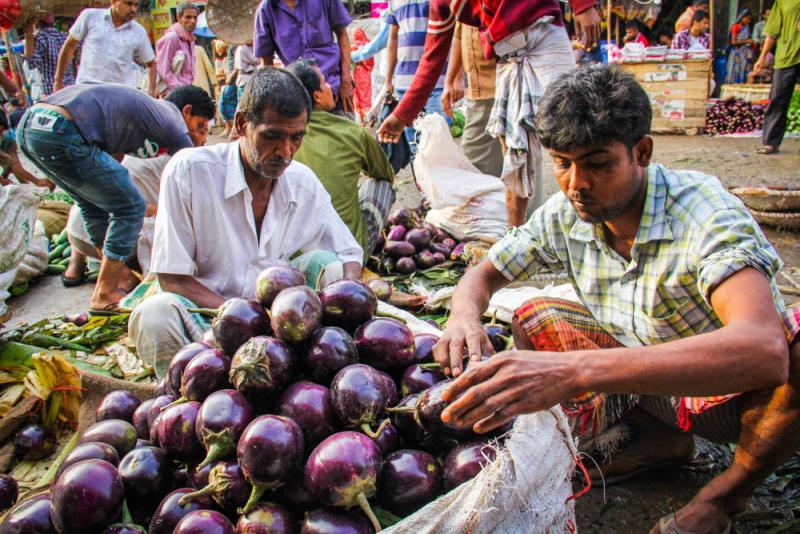Scientists have long attributed the sluggish advance of genetically engineered food products to weak political will, rather than shortcomings in the technology.
But recent global developments indicate that this will is getting stronger, as political leaders in key nations announce their support for GE food.
Most notably, the U.S. Food and Drug Administration approved the world’s first GE food animal the fast-growing AquAdvantage salmon in the waning months of 2015. The decision, which followed more than a decade of review, is particularly significant because other nations have been waiting for the U.S. to take the lead in this area of biotech.

Federal regulators also approved a GE chicken that produces a protein used in treating patients with lysosomal acid lipase (LAL) deficiency, though the animal’s meat and eggs cannot be consumed. And the FDA gave the nod to two new GE crops: the Arctic Apple and Simplot’s Innate potato. Both were bred to resist bruising and browning.
Africa also marked advances. Kenyan Deputy President William Ruto said last August that his government soon would end a ban on the import of GM products that was imposed in 2012. Various government ministries, departments and agencies concerned with biotechnology have already consulted and agreed on the necessary regulations and safety measures to be adhered to so that we can maximise on agricultural production, improve health services, conserve the environment, and basically improve the living standards of our people,” Ruto said.
Ugandan President Yoweri Kaguta Museveni took advantage of World Food Day celebrations in October 2015 to declare his strong support for agricultural biotech.
The future of biotech crops in Uganda is so bright, reports Nassib Mugwanya, a Ugandan agricultural outreach worker and 2015 Cornell Alliance for Science Global Leadership Fellow. It s just a matter of time that the current bill before parliament, which will allow for commercialization/deployment of biotech crops, will soon be passed into law. Biotech crops under research such as cassava, bananas (cooking type), maize, rice, and sweet potatoes are of strategic national and regional importance.

With the support of Agriculture Minister Matia Chowdhury, Bangladesh is emerging as the South Asia leader in agricultural biotechnology. The government has already approved commercial cultivation of four varieties of Bt brinjal eggplant engineered to resist the destructive fruit and shoot borer with approval of another five in the pipeline. Farmers growing the popular vegetable are reporting higher yields, better market prices, and significant reductions in pesticide use.
In a widely publicized ruling last month, the Supreme Court of the Philippines permanently halted field testing of Bt brinjal there. But Marshall Marlo Asis, a Global Leadership Fellow, said the decision does not spell doom for GE crops in his nation:
The Supreme Court did not stop scientific progress, Asis wrote in a blog post on the Cornell Alliance for Science website. Far from it in fact; the decision enables scientific progress by laying down the markers for a good regulatory process. All the government needs to do now is to draft and adopt, after intensive public consultations, the appropriate biosafety regulations. That should be doable in the next 12 months.
The Bangladesh Agriculture Research Institute (BARI) is meanwhile conducting research on other GE crops, including beta carotene-enriched Golden Rice, Bt cotton, and salt tolerant rice, says Arif Hossain, a Global Leadership Fellow from Bangladesh. BARI researchers recently conducted successful field trials of a GE potato bred to resist the devastating late blight virus, and will be seeking commercial approval this spring.
In neighboring India, the government of Prime Minister Narendra Modi has also opened the door to GE crops, approving field trials of transgenic rice, cotton, maize, mustard, brinjal, and chickpea.
We should establish without further delay a National Bio-safety Authority which inspires public, professional, political and media confidence,” urged eminent agricultural scientist M.S. Swaminathan, who has been called the father of India’s Green Revolution.
Despite the advances, anti-GMO activists worldwide continue to exert pressure on the political process.
The government of Bangladesh is positive about the ongoing research and success of Bt brinjal, Hossain reports. But I am afraid to inform you that we have an anti-Bt brinjal alliance comprised of few NGOs and environmental activists. Also there are few journalist who are directly working against Bt brinjal research and adoption.
Mugwanya says his country is also grappling with anti-GMO sentiment. Uganda being a vanguard of biotech research in Africa has made it ripe for opposition from activist groups within and outside, Magwanya reports. But, with Museveni’s leadership, the politicians who shape the policy landscape of Uganda are listening to scientists.
More advances in agricultural biotechnology seem likely so long as political will is shaped by science, rather than ideology. The question now is whether this newly emerging political will is strong enough to let agricultural biotechnology play a role in addressing the complex challenges of climate change.
